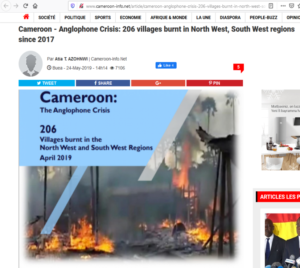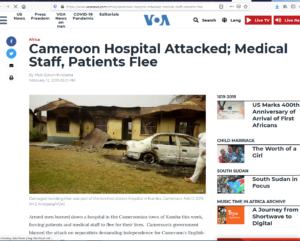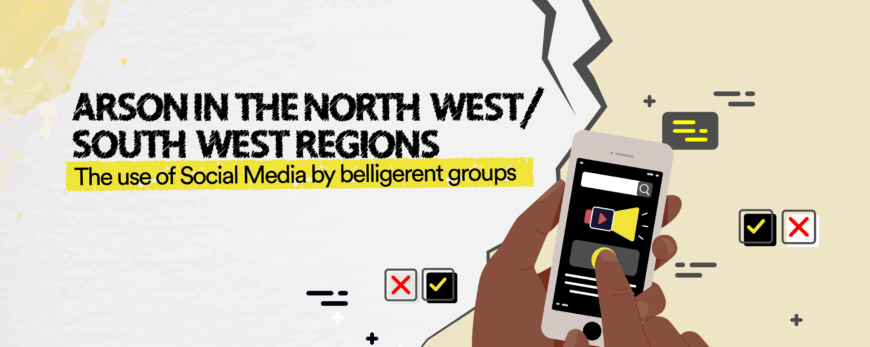Arson in the North-West/South-West regions:
The use of Social Media by belligerent groups

According to Miriam Webster dictionary, “arson” is the willful or malicious burning of property (such as a building), especially with criminal or fraudulent intent. Meanwhile, dictionary.cambridge.org defines“arson” as a noun and the crime of intentionally starting a fire to damage or destroy something, especially a building and provides synonyms like; to burn down or burn something down, burn to the ground, go up in flames, go up in smoke, consume and more. Dictionary.cambridge.org defines belligerent as wishing to fight or argue while Miriam Webster says it is inclined to or exhibiting assertiveness, hostility, or combativeness waging conflict.
As defined by en.wikipedia.org, social media are interactive computer-mediated technologies that facilitate the creation or sharing of information, ideas, career interests, and other forms of expression via virtual communities and networks. These include Facebook (and its associated Facebook Messenger) and Twitter; image and video sharing platforms (YouTube, Instagram, TikTok, Snapchat, Pinterest) etc.
For over four years now, Cameroon’s two English speaking regions; the Northwest and Southwest regions have not known peace, following a crisis that broke out in 2016, now referred to as the Anglophone crisis. The crisis that started with a lawyers strike has since evolved to an armed conflict between a group now known as the Ambazonia Defence Forces“ADF” commonly referred to as “Amba Boys”, seeking independence, and the state armed group, who are out to protect the territorial integrity of the state. Recently, arson attacks on schools, homes and villages have been the new twist as both parties engage themselves in this and seek to mourn the population’s feeling when either side perpetrate such. They do this using social media, sometimes fueling the hate speech and inciting violence while using dehumanising language.
In June 2018, BBC released a detailed report of the numerous arson acts in the country
The Center for Human Rights and Democracy in Africa (CHRDA) has analysed data from local sources and identified 206 villages partially or entirely burnt since the beginning of hostilities in Cameroon’sNorth-West/South-West Regions.
According to the 7-page report, 107 villages have been burnt in the North-West Region, 99 in the South-West Region. (https://www.chrda.org/wp-content/uploads/2019/05/206-Villages-burnt-.pdf )
The reports have not been balanced or backed by evidence in several cases, as seen in an article by Inner City Press, (http://www.innercitypress.com/cameroon1usfoiausun090718.html ), blaming the president of the Republic Paul Biya and his troops for the arson attacks solely, in an attempt to whip up sentiments towards their course.
Sometimes no evidence is presented of the military carrying out the attack, or what happened before the arson. As observed in this video published on TOP10NEWS with the caption: “CAMEROON MILITARY LOYAL TO PAUL BIYA CONTINUES BURNING VILLAGES IN AMBAZONIA AT VERGE OF ELECTIONS” here https://www.youtube.com/watch?v=STJO0Lqskqs.
Nevertheless, the non-state armed groups have equally had their share of the blame. A report published by Fulani news media says Amba boys from Ntamru area have burnt down the compound of SulebiBawa in Ntumbaw (Njiigajere) Ndu Sub-Division, Donga Mantung Division, NW Region. (https://www.facebook.com/fulaninewsmedia/posts/ambazonia-separatists-militias-burn-down-more-mbororo-homes-in-cameroonamba-boys/691870661424907/ ) According to the publication, the burning took place on August 21, 2020, while the men had gone to Friday prayers. The arson was carried out by 16 Amba boys sent by their new so-called General Boris after the Amba boys killed each other, including two previous leaders Taa and Fabrice. Boris is still suffering from an injury from their infighting. The report lays blame on the non-state armed group and presents information without any backing.
In a nexus of all these intricacies, it is the population that suffers, as in the case of armed men who burned down a hospital in the Cameroonian town of Kumba on February 11, 2019, forcing patients and medical staff to flee for their lives. (https://fulaninewsmedia.com/ambazonia-separatists-militias-burn-down-more-mbororo-homes-in-cameroon ) Cameroon’s government blamed the attack on separatists demanding independence for Cameroon’s English-speaking regions

There was a loss of lives as four people were reported to have been killed as a major hospital in Kumba, a city in Cameroon’s South-West region. Unknown attackers almost entirely burned down the hospital in the early hours of Monday, February 11 2019.
In some instances, students are abducted, for example, February 16, 2019, where 170 students, mostly girls under 18, were abducted by a group of armed separatists from a boarding school in Kumboin the North-West region of Cameroon. ( https://theowp.org/four-die-as-major-hospital-is-burnt-in-cameroon-war/ ) The separatists, who stormed the building in the early hours, also abducted a teacher and two guards. Everyone was released the following day amid rumours of ransoms paid.
The consequences are many, but conclusively, the Anglophone crisis has brought untold suffering to persons living in the North-West and South-West regions, according to an article published by online newsletter The New Humanitarian in March this year, “Nearly 900,000 people have been left homeless, and an additional 60,000 fled into neighbouring Nigeria. (https://www.thenewhumanitarian.org/news/2020/03/18/cameroon-conflict-aid-crisis ) The four-year conflict, triggered by the “perceived marginalisation” of the region from majority French-speaking Cameroon, has left at least 3,000 dead”.
There is a need for governments, humanitarian organisations and the world to call for an immediate ceasefire and more fruitful ways to end the current crisis, which has brought untold suffering to many. This can only be done through inclusive dialogue by the parties concerned.
Article By: Bambot Valentine Samgwa
Buea, Southwest Region of Cameroon

